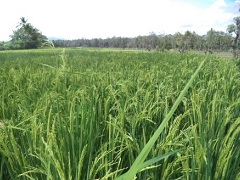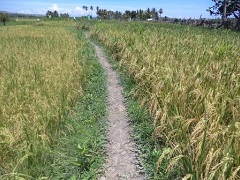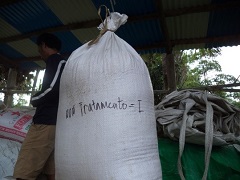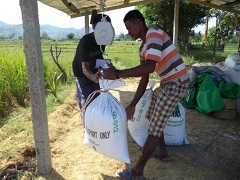- Home
- Technical Cooperation Projects
- Index of Countries
- Asia
- Timor-Leste
- The Project for Increasing Farmers Households' Income through Strengthening Domestic Rice Production in Timor-Leste
- Project News
- [No. 26] The Project released results of the Comparative Cropping to farmers in Buluto!!
Project News
2018-02-15
[No. 26] The Project released results of the Comparative Cropping to farmers in Buluto!!
The Project finally released results of the Comparative Cropping to the 12 target farmers in Buluto who joined it in the second cropping of last year. The Yield Survey on the Comparative Cropping confirmed that the average yield of the line transplanting was 3,930 kg/ha, whereas that of the random transplanting was only 2,797 kg/ha.
The 12 target farmers were surprised to see the results of the Comparative Cropping and started to make up their minds to increase the number of plots to conduct the line transplanting in their paddy fields in this season.
Mr. Jose Viegas (40), a farmer from Lifau village was able to produce 188kg in his line transplanting plot of 274 square meters, while his random transplanting plot of 147 square meters produced only 84.3kg. He was very much surprised by that result and decided to confirm its accuracy once again by expanding the line transplanting to two or three more of his plots in this cropping season. He appreciated the Project supporting farmers in increasing the production, while asking the Project to also focus on land levelling and seedling process. Mr. Elias Soares (41), another farmer from Vemasse Tasi village was also surprised with the result of the Yield Survey and is slowly changing his attitude toward the line transplanting by expanding the area to 2 more plots in this cropping season.
Mr. Odashima Nariyoshi, Japanese Expert on Rice Cultivation Techniques, said that the results of the line transplanting plot in the Yield Survey was satisfactory, therefore he expected that farmers who directly observed the result will be more motivated to apply the technique in their paddy fields in this cropping season. He reassured that farmers who properly manage and conduct regular supervision on their paddy fields will be able to increase their production. In addition, he said that during the second cropping of the last year, few farmers in Buluto cultivated their paddy fields due to the shortage of water from the irrigation, therefore in order to address this issue, he requested all the farmers in the area to follow the normalization of the Cropping Calendar as proposed by the MAF and the Project.
The Project will continue to work with the old target farmers in making sure that they are correctly applying the improved techniques and managing their paddy fields independently.
 Comparative Cropping in Buluto at the flowering stage
Comparative Cropping in Buluto at the flowering stage
 Comparative Cropping in Buluto at the ripening stage.
Comparative Cropping in Buluto at the ripening stage.
 Yield Survey conducted by the Project (1).
Yield Survey conducted by the Project (1).
 Yield Survey conducted by the Project (2).
Yield Survey conducted by the Project (2).
- About JICA
- News & Features
- Countries & Regions
- Our Work
- Thematic Issues
- Types of Assistance
- Partnerships with Other Development Partners
- Climate Change / Environmental and Social Considerations
- Evaluations
- Compliance and Anti-corruption
- Science and Technology Cooperation on Global Issues
- Research
- JICA Development Studies Program / JICA Chair
- Support for the Acceptance of Foreign HRs / Multicultural and Inclusive Community
- Publications
- Investor Relations
